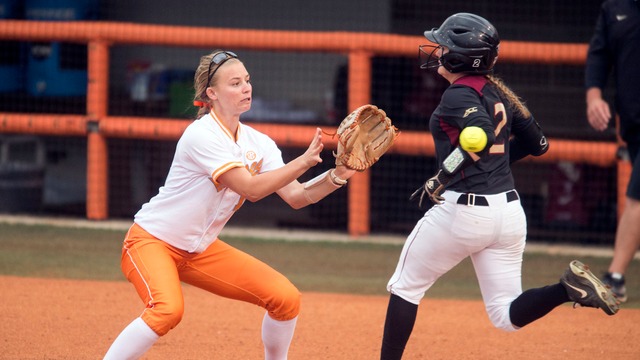NCAAOct 3, 2015 by Sarah Hoffman
Major Change to NCAA Super Regionals Proposed
Major Change to NCAA Super Regionals Proposed
Pictured: Alabama and Oklahoma went to an "if necessary" game in the 2015 super regionals. Alabama advanced to the WCWS.The NCAA recently formed the DI Comp

Pictured: Alabama and Oklahoma went to an "if necessary" game in the 2015 super regionals. Alabama advanced to the WCWS.
The NCAA recently formed the DI Competition Oversight Committee, and two primary issues the committee is turning its attention to are the financial aspects of championship events and the quality of the championship experience for student-athletes.
A significant result of the committee's deliberation is a proposed change to the structure of the NCAA Softball Super Regionals. The proposed change was referred to the DI Softball Committee and consists of the super regional format being extended from two days to three.
As it currently stands, the Super Regionals are two-day events held at the end of May on 8 campus sites. Each campus site includes two teams playing a best-of-three tournament format. Game one is the only game played on the first day of competition. Game two and an "if necessary" game three are played on the second day, with only 45 minutes between the two games. The final eight teams remaining after the super regional events advance to the Women’s College World Series.
In a press release from the NCAA, the committee outlined its concerns with the current two-day, three-game format. "Regarding the 'if necessary' third game, the Division I Softball Committee believes that contesting a game of this significance 45 minutes after the completion of game two does not provide a good championship experience. Student-athletes are not fresh and at their best under those circumstances."

The Tennessee/Florida State Super Regional was one of two in 2015 that went to an "if necessary" game three. Tennessee advanced to the WCWS.
The committee estimates that the financial repercussions of such a change could reach as high as $118,240 annually; though an estimate of $50,000 yearly may be more realistic given that average number of “if necessary” games over the last five years was around three games.
Other points for the committee to consider in their decision making process include the cost and logistics of travel for each school involved in the super regionals and the impact an extra day of travel and play could have on the student-athletes. Collegiate softball programs often operate on shoestring budgets, and the additional game on a separate day could wreak havoc on the travel planning and budget for many schools. Rebooking a last minute flight or finding hotel accommodations for an extra day for 15 players and upwards of 10 staff members would be a daunting logistical and financial task for any program.
An extra day on the field and on the road could also negatively impact the play of the advancing teams. Talk to any coach at the end of the season and they will all discuss the importance of recovery to the success of their postseason run. Getting their players back home to proper nutrition, recovery modalities, and out of airplanes and hotels would certainly be a concern for many coaches.
Though not set up exactly like the NCAA Super Regionals, the National Pro Fastpitch's Cowles Cup Championship Series uses a best-of-three series in its first round and includes an "if necessary" game on the same day as the day two game, much like the current super regional setup. The only — and albeit — major difference is that the NPF allows a six-hour break between game two and the "if necessary" game three.

The 2015 National Pro Fastpitch Cowles Cup bracket. Notice that the "if necessary" games are held on the same day as game two but with six hours between the two games.
Perhaps the solution to the NCAA Super Regional propostal has already been found in the NPF design of its first round of the Cowles Cup Championship. If the financial health of championship events is a focus of the committee, maybe they should forgo a proposed third day and consider structuring the day two games with more than 45 minutes between them.
Regardless of what the committee decides, softball fans know to expect some of the best softball in the planet when the 16 teams in the super regionals square off against each other for this year's series May 26-29, 2016.
The NCAA recently formed the DI Competition Oversight Committee, and two primary issues the committee is turning its attention to are the financial aspects of championship events and the quality of the championship experience for student-athletes.
A significant result of the committee's deliberation is a proposed change to the structure of the NCAA Softball Super Regionals. The proposed change was referred to the DI Softball Committee and consists of the super regional format being extended from two days to three.
As it currently stands, the Super Regionals are two-day events held at the end of May on 8 campus sites. Each campus site includes two teams playing a best-of-three tournament format. Game one is the only game played on the first day of competition. Game two and an "if necessary" game three are played on the second day, with only 45 minutes between the two games. The final eight teams remaining after the super regional events advance to the Women’s College World Series.
In a press release from the NCAA, the committee outlined its concerns with the current two-day, three-game format. "Regarding the 'if necessary' third game, the Division I Softball Committee believes that contesting a game of this significance 45 minutes after the completion of game two does not provide a good championship experience. Student-athletes are not fresh and at their best under those circumstances."

The Tennessee/Florida State Super Regional was one of two in 2015 that went to an "if necessary" game three. Tennessee advanced to the WCWS.
The committee estimates that the financial repercussions of such a change could reach as high as $118,240 annually; though an estimate of $50,000 yearly may be more realistic given that average number of “if necessary” games over the last five years was around three games.
Other points for the committee to consider in their decision making process include the cost and logistics of travel for each school involved in the super regionals and the impact an extra day of travel and play could have on the student-athletes. Collegiate softball programs often operate on shoestring budgets, and the additional game on a separate day could wreak havoc on the travel planning and budget for many schools. Rebooking a last minute flight or finding hotel accommodations for an extra day for 15 players and upwards of 10 staff members would be a daunting logistical and financial task for any program.
An extra day on the field and on the road could also negatively impact the play of the advancing teams. Talk to any coach at the end of the season and they will all discuss the importance of recovery to the success of their postseason run. Getting their players back home to proper nutrition, recovery modalities, and out of airplanes and hotels would certainly be a concern for many coaches.
Though not set up exactly like the NCAA Super Regionals, the National Pro Fastpitch's Cowles Cup Championship Series uses a best-of-three series in its first round and includes an "if necessary" game on the same day as the day two game, much like the current super regional setup. The only — and albeit — major difference is that the NPF allows a six-hour break between game two and the "if necessary" game three.

The 2015 National Pro Fastpitch Cowles Cup bracket. Notice that the "if necessary" games are held on the same day as game two but with six hours between the two games.
Perhaps the solution to the NCAA Super Regional propostal has already been found in the NPF design of its first round of the Cowles Cup Championship. If the financial health of championship events is a focus of the committee, maybe they should forgo a proposed third day and consider structuring the day two games with more than 45 minutes between them.
Regardless of what the committee decides, softball fans know to expect some of the best softball in the planet when the 16 teams in the super regionals square off against each other for this year's series May 26-29, 2016.